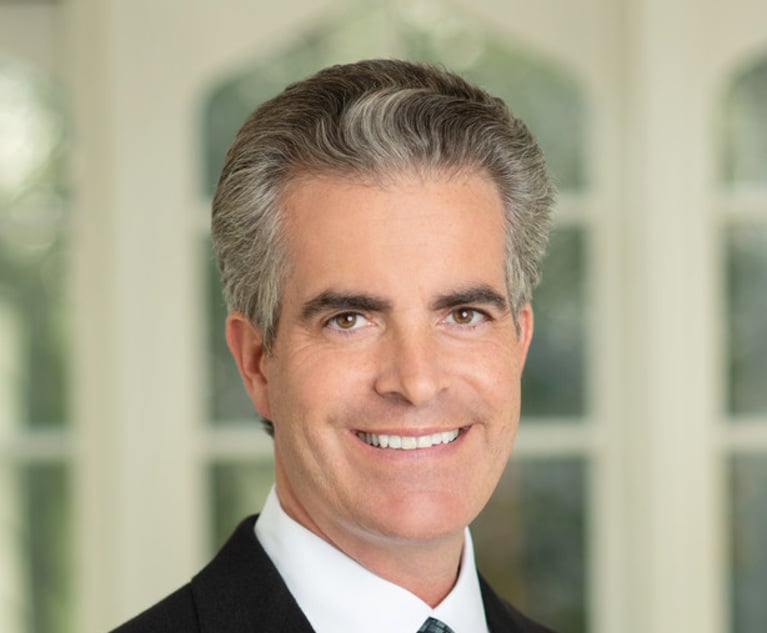Superior Court Orders New Trial in Medical Malpractice Case
The panel granted the request for a new trial following the plaintiff's claims that the Luzerne County court gave improper jury instructions and allowed a defense attorney to operate without restrictions.
October 09, 2019 at 03:47 PM
3 minute read
 Photo: Shutterstock
Photo: Shutterstock
The Pennsylvania Superior Court has vacated a defense verdict and ordered a new trial in a medical malpractice lawsuit stemming from the death of a man following his anesthetization for a colonoscopy.
A three-judge panel consisting of Judges Anne Lazarus, Maria McLaughlin and Mary Murray granted plaintiff Gerald Lacattiva's request for a new trial, after he argued that the Luzerne County court gave improper jury instructions and allowed a defense attorney to operate without restrictions.
The case stems from the death of John Ford, according to Lazarus' opinion. Ford, who had a history of atrial fibrulation, went to Lehigh Valley Hospital-Hazleton for a colonoscopy. Dr. Rajamanickam Natarajan and nurse Albert Adomitis handled the anesthetization.
Following the procedure, Ford's heart rate fell below normal. Lazarus said Natarajan immediately responded and began resuscitation. Ford underwent a tracheostomy and was transferred to another facility. Ford remained on life support for four months until he died, according to Lazarus.
Lacattiva, the administrator of Ford's estate, subsequently sued, but a Luzerne County judge found that the defendants were not negligent in their care of Ford. Lacattiva appealed.
Lacattiva argued that the trial court erred in denying his request that the jury charge include the entirety of Pennsylvania Suggested Standard Civil Jury Instruction 14.40, Lazarus said. Lacattiva claimed inconsistencies and alterations to Ford's medical records that were not properly annotated merited the charge, and that its exclusion prejudiced him.
"Appellant established the evidentiary basis for the instruction. The instruction the court gave prohibited the jury from considering 'negligent recordkeeping' as substantive evidence of negligence or breach of the standard of care, or cause of injury; the jury was allowed to consider it for impeachment purposes only," Lazarus said. "Although we acknowledge the fact that an alteration or destruction of medical records instruction does not direct that an adverse inference be found, here the jury was precluded from making that permissible inference."
Lacattiva also argued that the court erred in letting the hospital's counsel participate at trial when all named defendants were represented by counsel and the claims against the hospital were limited to vicarious liability, Lazarus said. But the Superior Court disagreed on that point.
"Hospital was a distinct defendant, listed on the verdict slip, with interests not necessarily the same as the other defendants. Hospital, therefore, was entitled to its own representation," Lazarus said.
Marion K. Munley of Munley Law in Scranton represented the plaintiff.
"I felt that the jury instruction on alteration of medical records should have been given, so I'm glad the Superior Court agreed with me." Munley said. "I look forward to trying the case again."
Kimberly G. Krupka represents the hospital and did not respond to a request for comment.
This content has been archived. It is available through our partners, LexisNexis® and Bloomberg Law.
To view this content, please continue to their sites.
Not a Lexis Subscriber?
Subscribe Now
Not a Bloomberg Law Subscriber?
Subscribe Now
NOT FOR REPRINT
© 2025 ALM Global, LLC, All Rights Reserved. Request academic re-use from www.copyright.com. All other uses, submit a request to [email protected]. For more information visit Asset & Logo Licensing.
You Might Like
View All
Superior Court Rejects Pa. Hospital's Challenge to $7.3M Med Mal Judgment
3 minute read
Longtime Reed Smith Health Care Partner Opts for Solo Practice Over Retirement
3 minute read
Pa. Appeals Court: Trial Judge Dismissed Med Mal Claims Without Giving Plaintiffs Proper Time to Fight Back
4 minute read
Pa. Hospital Agrees to $16M Settlement Following High Schooler's Improper Discharge
4 minute readTrending Stories
Who Got The Work
J. Brugh Lower of Gibbons has entered an appearance for industrial equipment supplier Devco Corporation in a pending trademark infringement lawsuit. The suit, accusing the defendant of selling knock-off Graco products, was filed Dec. 18 in New Jersey District Court by Rivkin Radler on behalf of Graco Inc. and Graco Minnesota. The case, assigned to U.S. District Judge Zahid N. Quraishi, is 3:24-cv-11294, Graco Inc. et al v. Devco Corporation.
Who Got The Work
Rebecca Maller-Stein and Kent A. Yalowitz of Arnold & Porter Kaye Scholer have entered their appearances for Hanaco Venture Capital and its executives, Lior Prosor and David Frankel, in a pending securities lawsuit. The action, filed on Dec. 24 in New York Southern District Court by Zell, Aron & Co. on behalf of Goldeneye Advisors, accuses the defendants of negligently and fraudulently managing the plaintiff's $1 million investment. The case, assigned to U.S. District Judge Vernon S. Broderick, is 1:24-cv-09918, Goldeneye Advisors, LLC v. Hanaco Venture Capital, Ltd. et al.
Who Got The Work
Attorneys from A&O Shearman has stepped in as defense counsel for Toronto-Dominion Bank and other defendants in a pending securities class action. The suit, filed Dec. 11 in New York Southern District Court by Bleichmar Fonti & Auld, accuses the defendants of concealing the bank's 'pervasive' deficiencies in regards to its compliance with the Bank Secrecy Act and the quality of its anti-money laundering controls. The case, assigned to U.S. District Judge Arun Subramanian, is 1:24-cv-09445, Gonzalez v. The Toronto-Dominion Bank et al.
Who Got The Work
Crown Castle International, a Pennsylvania company providing shared communications infrastructure, has turned to Luke D. Wolf of Gordon Rees Scully Mansukhani to fend off a pending breach-of-contract lawsuit. The court action, filed Nov. 25 in Michigan Eastern District Court by Hooper Hathaway PC on behalf of The Town Residences LLC, accuses Crown Castle of failing to transfer approximately $30,000 in utility payments from T-Mobile in breach of a roof-top lease and assignment agreement. The case, assigned to U.S. District Judge Susan K. Declercq, is 2:24-cv-13131, The Town Residences LLC v. T-Mobile US, Inc. et al.
Who Got The Work
Wilfred P. Coronato and Daniel M. Schwartz of McCarter & English have stepped in as defense counsel to Electrolux Home Products Inc. in a pending product liability lawsuit. The court action, filed Nov. 26 in New York Eastern District Court by Poulos Lopiccolo PC and Nagel Rice LLP on behalf of David Stern, alleges that the defendant's refrigerators’ drawers and shelving repeatedly break and fall apart within months after purchase. The case, assigned to U.S. District Judge Joan M. Azrack, is 2:24-cv-08204, Stern v. Electrolux Home Products, Inc.
Featured Firms
Law Offices of Gary Martin Hays & Associates, P.C.
(470) 294-1674
Law Offices of Mark E. Salomone
(857) 444-6468
Smith & Hassler
(713) 739-1250





